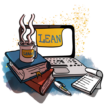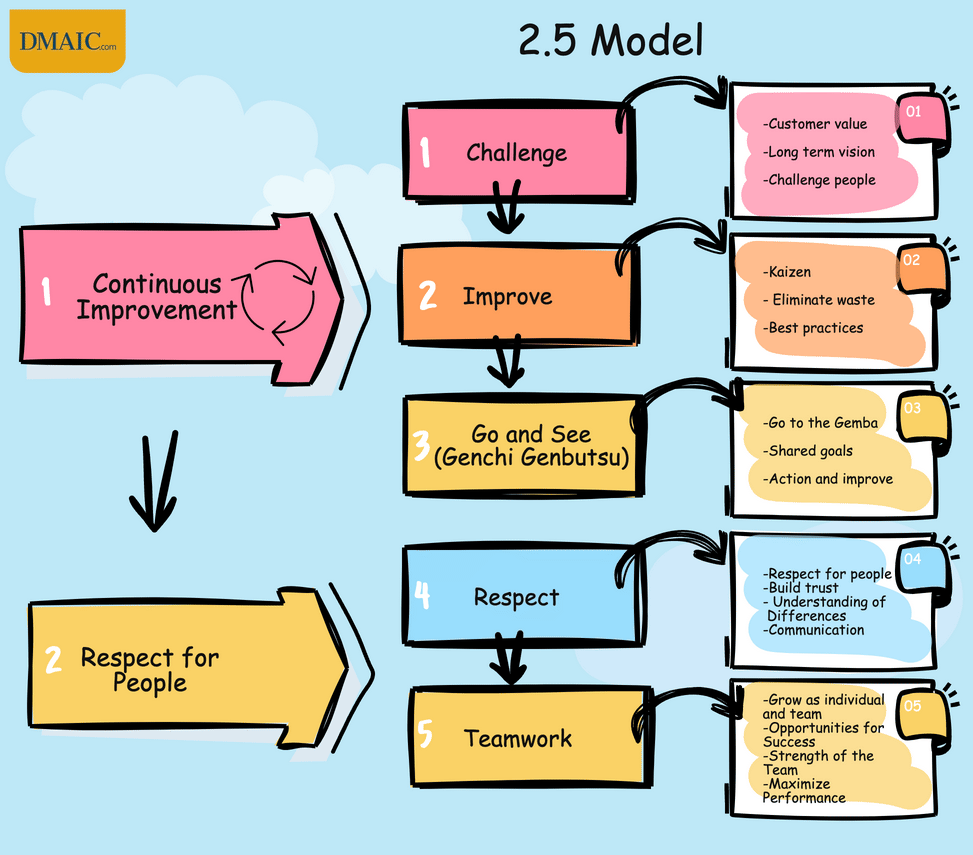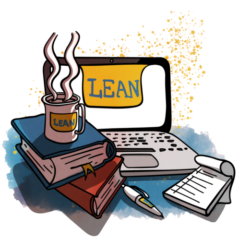-
How it works
How does it work?
Dmaic.com offers comprehensive and fully accredited online Lean training.
Read more Online packagesOnline trainingClassroom trainingsClassroom and in-company training
Online packagesOnline trainingClassroom trainingsClassroom and in-company trainingDmaic.com also offers classroom Lean and Lean Six Sigma training courses Read more
- Pricing
- Companies
- Knowledge
 Knowledge baseWant to know more about Dmaic and what Dmaic means for other companies? Check the Dmaic.com knowledge base.
Knowledge baseWant to know more about Dmaic and what Dmaic means for other companies? Check the Dmaic.com knowledge base. Online WorkshopsDon't immediately choose a course for you: do you want the knowledge and tools with which you can get started right away? Then a Dmaic-workshop is for you.
Online WorkshopsDon't immediately choose a course for you: do you want the knowledge and tools with which you can get started right away? Then a Dmaic-workshop is for you.- About
What is Lean Management?
Lean Management: An Approach for Organizational Excellence
Lean management is more than a set of tools or methods; it’s a comprehensive mindset underpinned by a series of principles derived from the Toyota Management System (TMS). Central to Lean management is the cultivation of a culture of continuous improvement within organizations. This approach is anchored in a long-term vision, focusing on eliminating waste in processes, empowering individuals to excel, and resolving problems effectively. At its core, Lean management prioritizes the people within the organization, recognizing their crucial role in achieving operational excellence.
Lean management encompasses various models, including the 2.5 model, the 4P model, and the 14 principles of Toyota’s Lean Management. These models are not isolated components but are interrelated, forming the foundation of Lean management. Each model contributes a unique perspective, enhancing the overall efficiency and effectiveness of organizational processes. In this article, I will delve into these models, exploring how they interconnect and collectively shape the Lean management philosophy.
The Core of Lean Management: People and Processes
Every year, I visit Japan to learn from Toyota and the Toyota Management Institute in Nagoya. For 15 consecutive years, my focus has consistently been on understanding their approach. A central tenet they always emphasize is that Lean management is fundamentally about the people in the organization. “First develop people, and they will improve the processes,” is a key lesson.
Effective Lean management requires a unified mindset shift across the organization. Every member must align their thinking and utilize specific tools and techniques aimed at minimizing waste and maximizing customer value. Although tools in Lean management are essential, they are secondary to the importance of the people involved. This people-first approach is a fundamental aspect of the Toyota Management System (TMS), a pioneering model in implementing Lean principles.
The Role of Motivated People in Lean Management
Lean management depends on the commitment of individuals to regular improvement activities, demanding motivation beyond their standard duties. Creativity is encouraged, with people generating ideas to solve process-related problems. The focus within the Toyota Production System is on developing people and teams that embody the company’s philosophy, leading to exceptional results. Employees at Toyota are systematically trained in problem-solving techniques.
The Culture of a Lean Management Organization:
- Leaders maintain a long-term vision, acknowledging the need for consistent improvements.
- Employees continually assess and aim to standardize activities in processes, seeking to eliminate waste.
- Every member of the organization persistently contributes improvement ideas.
Embracing Lean: Involving and Empowering People
True Lean management involves engaging people in the process, providing them with the resources to challenge and enhance their methods of working, and instilling a sense of capability and empowerment.
In Lean management, the creative potential of people is a critical asset that should never be underestimated or overlooked. This concept is at the heart of what is known as the ‘invisible strategy’, a key element in Toyota’s approach to continuous improvement and organizational excellence.
Aligning with the Toyota Management System (TMS)
The Toyota Management System posits that the success of Lean management relies on the synergistic relationship between people and processes. TMS underscores the importance of people as the primary drivers of sustained improvement and innovation, beyond just the tools and techniques employed. Organizations that invest in their people’s development and cultivate an environment where every employee actively engages in problem-solving and process improvement truly capture the essence of Lean management.
Toyota’s 2.5 Model: The Foundation of an ‘Invisible Strategy’
Toyota’s remarkable success, underpinned by its ‘invisible strategy,’ is rooted in a consistent pursuit and refinement of the 2.5 model since 1950. This model is not just a set of guidelines but a comprehensive blueprint that guides every Toyota employee in the collective effort toward process perfection and customer satisfaction.
The two principles and five topics that form the core of this model are:
1 – Principles of Continuous Improvement in the 2.5 Model
- Challenge: This involves creating value, maintaining a long-term vision, and challenging people to strive for excellence.
- Improve: It emphasizes daily Kaizen practices, the elimination of wastes, and the adoption of best practices.
- Genchi Genbutsu: This principle focuses on experiencing the actual work site (‘Gemba’), setting collective goals, and taking decisive action.
2 – Respect for People: A Pillar of Lean Management in the 2.5 Model
- Respect: This encompasses respect for others, building trust, understanding differences, and fostering real communication.
- Teamwork: It highlights growing both as individuals and as teams, creating opportunities for success, harnessing the power of teamwork, and maximizing performance.

Lean management, as exemplified in Toyota’s 2.5 model, is intrinsically centered around people. This approach extends beyond merely imparting technical skills; it nurtures a mindset of continuous improvement and deep respect for individuals. Training and development in this context are designed to foster both technical proficiency and a culture of ongoing personal and professional growth. This people-centric philosophy is a cornerstone of Lean management, contributing significantly to its effectiveness in organizational development and success.
Understanding the 4P Model of Toyota’s Lean Management Principles:
Jeffrey K. Liker, drawing on the ‘hidden strategy’ underlying Toyota’s success, formulated the 4P model. This model distills Toyota’s extensive principles into a more concise and accessible framework, capturing the core of Toyota’s Lean management philosophy:
-
-
- Philosophy: The bedrock of the 4P model is long-term thinking. This philosophy emphasizes building a robust foundation for decision-making processes, prioritizing long-term outcomes over short-term financial gains. It’s about creating a sustainable vision for the future.
- Process: Here, the focus is on eliminating waste within processes. The principle underscores the importance of refining operations to enhance both efficiency and quality, ensuring that every step in a process adds value and minimizes unnecessary expenditure of resources.
- People & Partners: Central to this principle is the respect, challenge, and development of people and partners. It highlights the significance of nurturing collaborative and respectful relationships with both employees and business partners, recognizing that mutual growth and understanding are key to sustained success.
- Problem Solving: This involves a continuous, proactive approach to identifying and resolving the root causes of problems. It encourages a culture of critical thinking and learning, where problems are seen as opportunities for improvement and innovation.
-
Integrating the 14 Principles with Toyota’s 4P Model:
The 14 principles outlined by Jeffrey K. Liker are intricately linked to the 4Ps – Philosophy, Process, People & Partners, and Problem Solving. This integration underscores Toyota’s holistic approach to management, as detailed in Liker’s seminal work, ‘The Toyota Way’. These principles, which are rooted in Toyota’s 2.5 model and aligned with the 4P framework, form the backbone of Toyota’s operational approach and have set a global benchmark for Lean management practices. Each principle is integral in building a culture focused on continuous improvement and operational excellence.
These 14 principles have not only shaped Toyota’s success but have also inspired countless organizations worldwide to adopt Lean management methodologies. They offer a comprehensive blueprint for businesses aiming to implement Lean principles effectively, ensuring a balance between strategic vision, operational efficiency, people-centric leadership, and a culture of problem-solving and innovation.
The 14 Principles of Toyota’s Lean Management:
1 – The Long-Term Philosophy in Lean Management
-
-
- Prioritize Long-Term Value Over Short-Term Gains: Make decisions with a long-term perspective that prioritizes lasting value for the customer, placing long-term stability and sustainability ahead of immediate financial benefits.
- Generate Value Across the Board: Evaluate every function and part of the organization for its contribution to overall value creation for the customer, society, and the economy.
- Ownership and Responsibility: Encourage a culture where individuals take responsibility and ownership of their roles and contributions.
- Unified Towards a Collective Goal: Aim towards a collective goal, like Toyota’s ethos of ‘good thinking, good products,’ to unite and drive the organization.
-
2 – Processes in Lean Management: Eliminating Waste for Efficiency
-
-
- Efficient Flow to Highlight Issues: Establish an efficient flow within processes to quickly identify problems or issues.
- Re-Designing Processes for Value Addition: Continually review and redesign processes to ensure they add value.
- Rapid Distribution of Materials and Information: Ensure materials and information reach the right people promptly.
- Making the Stream Visible: Enhance process visibility for easier monitoring and management.
-
3 – Adopting ‘Pull’ Systems in Lean Processes: Meeting Actual Demand
-
-
- Demand-Driven Production: Align production strictly with actual customer demand.
- Just-In-Time Delivery: Focus on delivering products or services precisely when needed.
- Minimizing Work in Progress and Raw Materials: Keep work in progress and raw material inventories to a minimum.
- Empowering the Shop Floor for Planning: Place detailed planning responsibility at the shop floor level.
-
4 – Heijunka: Embracing an Even Work Rhythm in Lean Management
-
-
- Maintaining Minimal Inventory for Work Pressure Balance: Keep just enough inventory to balance variations in work pressure.
- Avoiding Overburdening Employees: Do not push employees to their limits when there is no immediate customer demand.
- Utilizing Free Time for Improvement: Use lower demand periods for continuous improvement activities.
-
5 – Cultivating a Culture of Immediate Problem-Solving for Reliable Processes
-
-
- Fostering Quality Awareness: Build a culture where quality is everyone’s responsibility.
- Empowering People to Solve Problems: Ensure employees have the skills and authority to address problems as they occur.
- Integrating Jidoka Principles (Automated Stop): Implement systems that automatically halt production when an error is detected.
-
6 – Standardized Tasks: Paving the Way for Continuous Improvement and Employee Empowerment
-
-
- Establishing Process Knowledge through Standards: Document the most efficient and effective ways to complete tasks.
- Encouraging Creativity in Improving Standards: Allow employees the freedom to experiment and suggest improvements.
- Incorporating Improvements into New Standards: Update standards continually with validated improvements.
-
7 – Implementing Visual Controls for Immediate Problem Identification in Lean Management
-
-
- Utilizing Simple Visual Tools for Immediate Detection: Employ straightforward visual tools to indicate deviations.
- Strategic Placement of Signage for Workplace Visibility: Display clear signage and indicators throughout the workplace.
-
8 – Prudent Use of Technology in Lean Management: Ensuring Reliability and Support for People and Processes
-
-
- Technology as an Aid, Not a Burden: Assist employees in their tasks without overwhelming them.
- Thorough Testing Before Implementation: Introduce new technologies only after rigorous testing.
- Encouraging Employees to Embrace New Technologies: Foster a culture where experimenting with technology is seen as a pathway to innovation.
-
9 – Fostering Leadership in Tune with Lean Principles for Organizational Growth
-
-
- Personal Development of Leaders: Nurture leaders through education and training in Lean principles.
- Leadership Beyond Executive Roles: Set the right example through personal skills and actions.
- In-depth Knowledge of Day-to-Day Operations: Ensure leaders are familiar with the details of everyday work.
-
10 – Cultivating Exceptional People and Teams in Alignment with Organizational Philosophy
-
-
- Fostering a Strong, Stable Culture: Cultivate an environment where values and ideas are shared and embraced.
- Training in the Company’s Philosophy: Embed the company’s philosophy into the training of individuals and teams.
- Leveraging Multifunctional Teams for Improvement: Utilize teams with diverse skills for driving improvements.
-
11- Embracing Genchi Genbutsu: The Practice of Going to the Source for Deeper Understanding in Lean Management
-
-
- Solving Problems at the Source: Address issues with firsthand observation and data collection.
- Basing Decisions on Direct Observations and Data: Ground decisions in personal observations and factual data.
- Involving Higher Management in Direct Observation: Engage all organizational levels in Genchi Genbutsu.
-
12 – Respect your chain partners (suppliers) by challenging them and helping them
-
-
- Respect suppliers and partners and view them as an expansion of your management.
- Challenge suppliers and partners to improve and show that you appreciate them.
-
13 – Balancing Deliberation and Speed in Decision-Making in Lean Management
-
-
- Comprehensive Evaluation of Options: Explore all possible options and viewpoints thoroughly.
- Seeking Consensus Amongst Stakeholders: Involve everyone affected in discussions to build consensus.
-
14- Embracing Continuous Learning and Improvement in Lean Management
-
-
- Applying Continuous Improvement (Kaizen): Identify and address the root causes of problems methodically.
- Fostering a Culture of Reflection and Feedback: Engage employees in reflection and feedback to learn and adapt.
-
Conclusion and Summary: Understanding Lean Management – Principles for Continuous Improvement
Lean Management, exemplified by Toyota’s renowned methodologies, is a holistic approach that transcends mere operational tactics. It’s an ethos that integrates people, processes, and continuous improvement into the very fabric of an organization. Here’s a summary of the key principles and concepts:
-
-
- People and Processes at the Core: The heart of Lean Management lies in its focus on people and processes. The philosophy that “First develop people, and they will improve the processes” underpins Toyota’s approach, emphasizing the significance of human potential and a unified mindset across the organization.
- The Toyota Management System (TMS): This system highlights the interdependence of people and processes, underscoring the role of human ingenuity in driving continuous improvement and innovation.
- Continuous Improvement and Training: At Toyota, there’s a strong emphasis on continuous improvement (Kaizen) and training within the 2.5 Model, fostering a culture where every member of the organization is engaged in the pursuit of operational excellence.
- The 4P Model: Jeffrey K. Liker’s 4P model distills Toyota’s practices into four key areas: Philosophy, Process, People & Partners, and Problem Solving. This model encapsulates the essence of Toyota’s Lean management philosophy.
- Adoption of Lean Principles: These principles offer a comprehensive blueprint for businesses aiming to implement Lean management, balancing strategic vision, operational efficiency, people-centric leadership, and a culture of innovation and problem-solving.
- Practical Application: From fostering a culture of immediate problem-solving to employing visual controls for efficiency, Toyota’s principles are not just theoretical concepts but practical guidelines that have shaped its success and inspired global adoption.
- Leadership and Organizational Culture: Lean Management advocates for leadership that is deeply ingrained in Lean principles and an organizational culture that aligns with the company’s philosophy, driving improvements and fostering a strong, stable environment.
- Genchi Genbutsu and Decision-Making: Emphasizing the importance of firsthand observation and data for problem-solving (Genchi Genbutsu), and a balanced approach to decision-making that combines thorough deliberation with rapid implementation.
- Respecting and Developing People: Central to Lean Management is the development of individuals and teams who resonate with the organization’s philosophy, culminating in a workforce that embodies the principles of continuous improvement and respect for others.
-
In conclusion, Lean Management is more than a set of operational guidelines; it’s a comprehensive philosophy that integrates continuous improvement, respect for people, and a focus on efficiency and quality into every aspect of an organization. By embracing these principles, organizations can cultivate a culture of excellence, innovation, and sustained growth.
Every organization can derive valuable insights from these 14 Lean Management principles, whether they choose to implement them fully or partially. These principles offer guidance and strategies that can be beneficial in any business context.
Unlock Your Potential with Online Lean Black Belt Training
Discover the fundamentals of lean management.
Are you ready to become a change-maker in your organization? Transform how you lead teams and foster continuous improvement with our comprehensive Online Lean Black Belt Training. Whether your goal is to refine processes within your department or to spearhead impactful change initiatives, this training is your gateway to mastering Lean principles. Immerse yourself in our interactive Lean Black Belt e-learning course today, and gain the essential skills and knowledge to guide your organization toward greater efficiency and excellence. Are you prepared to elevate your expertise and make a substantial impact? Enroll now and start your journey to becoming a Lean expert!

